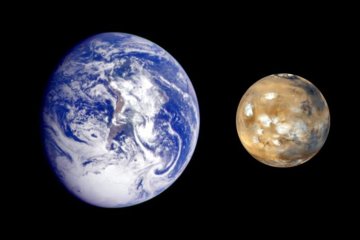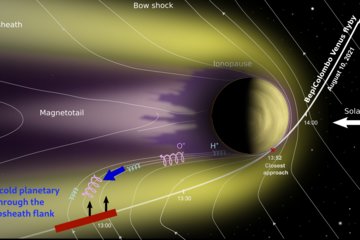All genres
101.
Journal Article
Hf-W chronology of the eucrite parent body. Geochimica et Cosmochimica Acta 156, pp. 106 - 121 (2015)
102.
Journal Article
Evidence for Mo isotope fractionation in the solar nebula and during planetary differentiation. Earth and Planetary Science Letters 391, pp. 201 - 211 (2014)
103.
Journal Article
Cosmogenic 180W variations in meteorites and re-assessment of a possible 184Os-180W decay system. Geochimica et Cosmochimica Acta 140, pp. 160 - 176 (2014)
104.
Journal Article
Nucleosynthetic W isotope anomalies and the Hf-W chronometry of Ca-Al-rich inclusions. Earth and Planetary Science Letters 403, pp. 317 - 327 (2014)
105.
Journal Article
Protracted core formation and rapid accretion of protoplanets. Science 344, pp. 1150 - 1154 (2014)
106.
Journal Article
Rb-Sr chronology of volatile depletion in differentiated protoplanets: BABI, ADOR and ALL revisited. Earth and Planetary Science Letters 374, pp. 204 - 214 (2013)
107.
Journal Article
Experimental evidence for Mo isotope fractionation between metal and silicate liquids. Earth and Planetary Science Letters 379, pp. 38 - 48 (2013)
108.
Journal Article
Neutron capture on Pt isotopes in iron meteorites and the Hf-W chronology of core formation in planetesimals. Earth and Planetary Science Letters 361, pp. 162 - 172 (2013)
109.
Journal Article
The abundance and isotopic composition of Cd in iron meteorites. Meteoritics and Planetary Science 48, pp. 2597 - 2607 (2013)
110.
Journal Article
Core Formation and Mantle Differentiation on Mars. Space Science Reviews 174, pp. 27 - 48 (2013)
111.
Journal Article
Isotopic evidence for chondritic Lu/Hf and Sm/Nd of the Moon. Earth and Planetary Science Letters 380, pp. 77 - 87 (2013)
112.
Journal Article
Origin of isotopic heterogeneity in the solar nebula by thermal processing and mixing of nebular dust. Earth and Planetary Science Letters 357, pp. 298 - 307 (2012)
113.
Journal Article
Nucleosynthetic Tungsten Isotope Anomalies in Acid Leachates of the Murchison Chondrite: Implications for Hafnium-Tungsten Chronometry. The Astrophysical Journal 753, p. L6 (2012)
114.
Journal Article
Thermal evolution and sintering of chondritic planetesimals. Astronomy and Astrophysics 537, p. A45 (2012)
115.
Journal Article
Thermal evolution and sintering of chondritic planetesimals. Astronomy and Astrophysics 537, p. A45 (2012)
116.
Journal Article
Chronology of the angrite parent body and implications for core formation in protoplanets. Geochimica et Cosmochimica Acta 84, pp. 186 - 203 (2012)
117.
Journal Article
Hf-W chronometry of core formation in planetesimals inferred from weakly irradiated iron meteorites. Geochimica et Cosmochimica Acta 99, pp. 287 - 304 (2012)
118.
Journal Article
Refractory element fractionation in the Allende meteorite: Implications for solar nebula condensation and the chondritic composition of planetary bodies. Geochimica et Cosmochimica Acta 85, pp. 114 - 141 (2012)
119.
Journal Article
Molybdenum isotope anomalies in meteorites: Constraints on solar nebula evolution and origin of the Earth. Earth and Planetary Science Letters 312, pp. 390 - 400 (2011)
120.
Journal Article
Geoscience: Earth's patchy late veneer. Nature 477, pp. 168 - 169 (2011)











